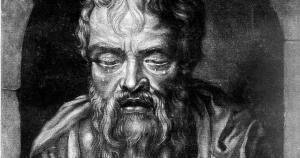
The soil under my feet was yellow dirt with small rocks and the sky above me was blue, a simmering sun. The olive trees gave shade so I could look down toward the sea standing on the edge of a ruined Mycenaean palace. Just that moment, in the home of Agamemnon, shepherd of the people herded to Troy, I knew why men loved Zeus.
He fit the scene: beautiful, fierce, civilization and ruin with the hope that something glorious and good might be buried under the dirt: ancient beauty, goodness, and truth.
Stuff, the dirt, the rocks, the sky, the sun mattered to me. The sun burned my skin, the rocks were hard on my feet, and the soil stuck to every part of me. Still there was depth, more to the experience: the sun was hot, but brilliantly beautiful.
The great god, the stories said, ruled all other gods, Demi-gods, and men and this god Zeus was a savior from the horrors of chaos. Zeus brought balance between heaven and earth and kept the worst monsters at bay: Zeus was called all good and he would purify those who sought him. The thunderbolt was his weapon and nothing could long stand against his will. Yet Zeus was not all powerful, the fates would someday bring his rule to an end. In other stories, Zeus was terrible in his power: taking what he wanted. He was awful and the awe inspired while his lusts created fear.
Whatever men encountered that they called Zeus, the stories grew. Under all the tales was something different than the details: Zeus was fearful, out of control with his own desires, but he also was the friend of strangers. If you were cruel to an alien guest, then Zeus would bring justice to you! He was universal, worshipped by all the Greeks. There were, according to the first philosophers, seemingly two beings: one good, the other not so good.
There can be many gods, numberless powers, but only one omnipotent God: logically only one being can be all powerful! Zeus was a name given to the god on Olympus who took what he wished, got duped by Hera his long suffering wife, and toyed with men as entertainment to hold off the boredom of deathlessness. Zeus also was the protector of marriage, friendship, and the god who could bring a good wind when a sailor needed one. The duality is in Homer where Zeus is manipulated by a lesser goddess (Thetis!), but who is also described as having a will nobody can defy.
Heraclitus of Ephesus broke down the duality to the truth beneath.
Heraclitus was the greatest Ephesian until the Mother of God came to the city with Saint John. This early philosopher heard the stories of Zeus. He was seeking a divine Logos, a Word, Order, Logic, a Divine Fire that could provide order and pattern to the changing world. Heraclitus could not worship the Zeus of lustful desires, the immoral tyrant who got away with murder, but he could love the God who was all-wise.
This “all-powerful one” was Zeus and not Zeus: like the savior, unlike the bully-god.
Heraclitus put it this way:
228 One thing, the only truly wise, does not and does consent to be called by the name of Zeus.*
The myths about Zeus that Heraclitus had inherited, like all enduring human things, were a blend of insight, nonsense, and the diabolical. Men had experienced something and named it Zeus when they felt or saw a being with kingly power. Soon an earthly and a heavenly Zeus were conflated and confusion resulted.
One Zeus was unfit for a free man’s service, the other a proper object of a free person’s worship.
That day in the rubble of Agamemnon’s city I felt the tug of both images of Zeus: the god and the good God. The sun was near the top of the sky, the dirt was stirred by a hot, dry wind, things were changing. The city, however, was made of the stones that had been there thousands of years, the sun rising and setting: wind, dirt, rocks, olive trees. These changed, perhaps, but too slowly for me to see. Underneath were the ideas of light, spirit, matter, life. These did not change.
The one thing, the only truly wise, under all, the God whose Mind contains the first principles of the world does and does not consent to be called by the name of Zeus; the old city was waiting for a better name. And of course later nearby, I would pray in a church, ancient by American standards, young to Mycenaean time. I worshiped God with a proper name: seen in the person of Jesus Christ: the Logos of God.
——————————————-
*The Pre-Socratic Philosophers, editors Kirk, Raven, and Schofield, 2013, page











